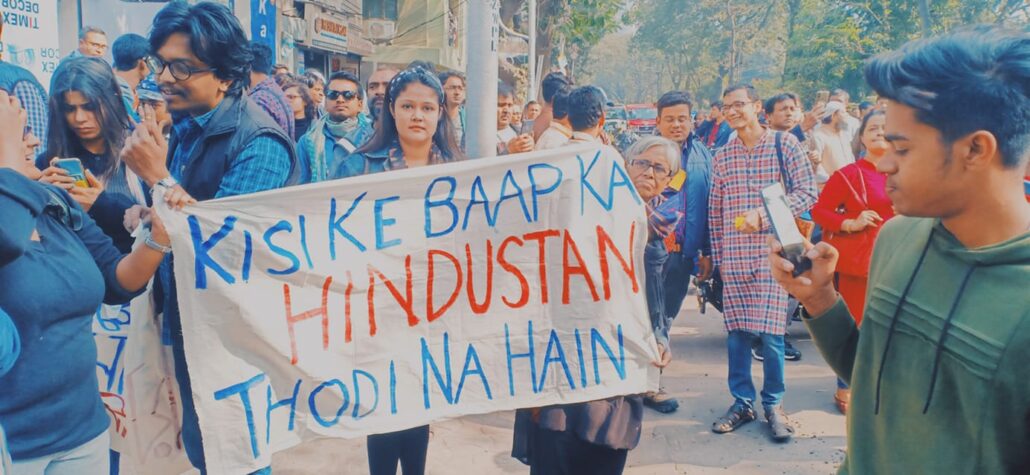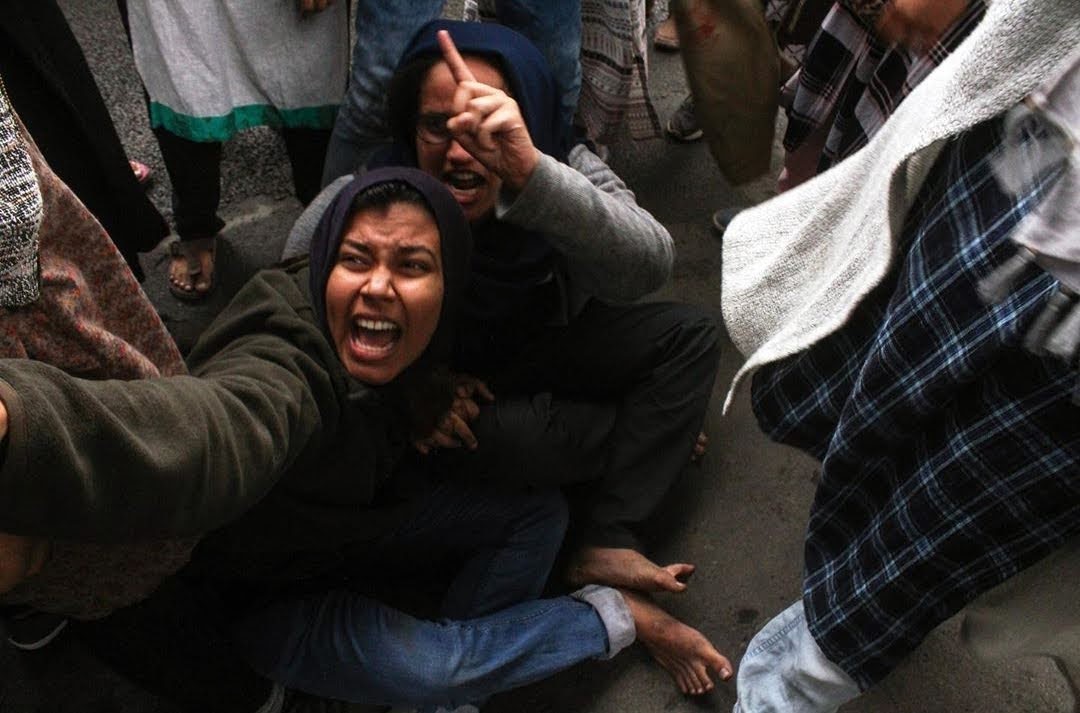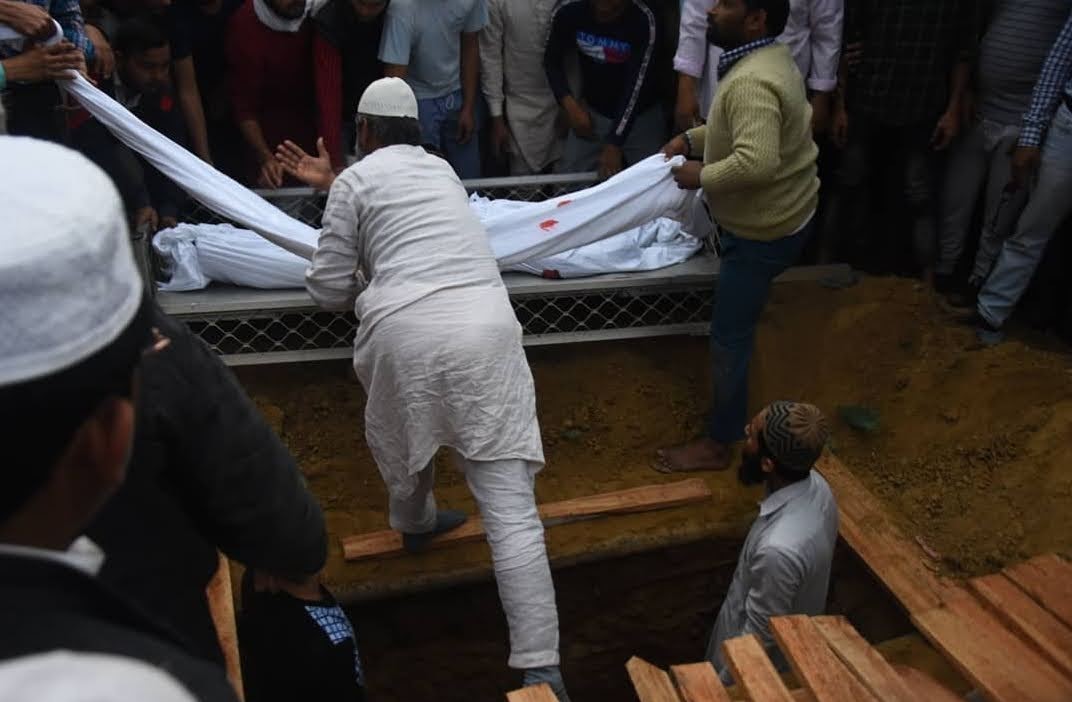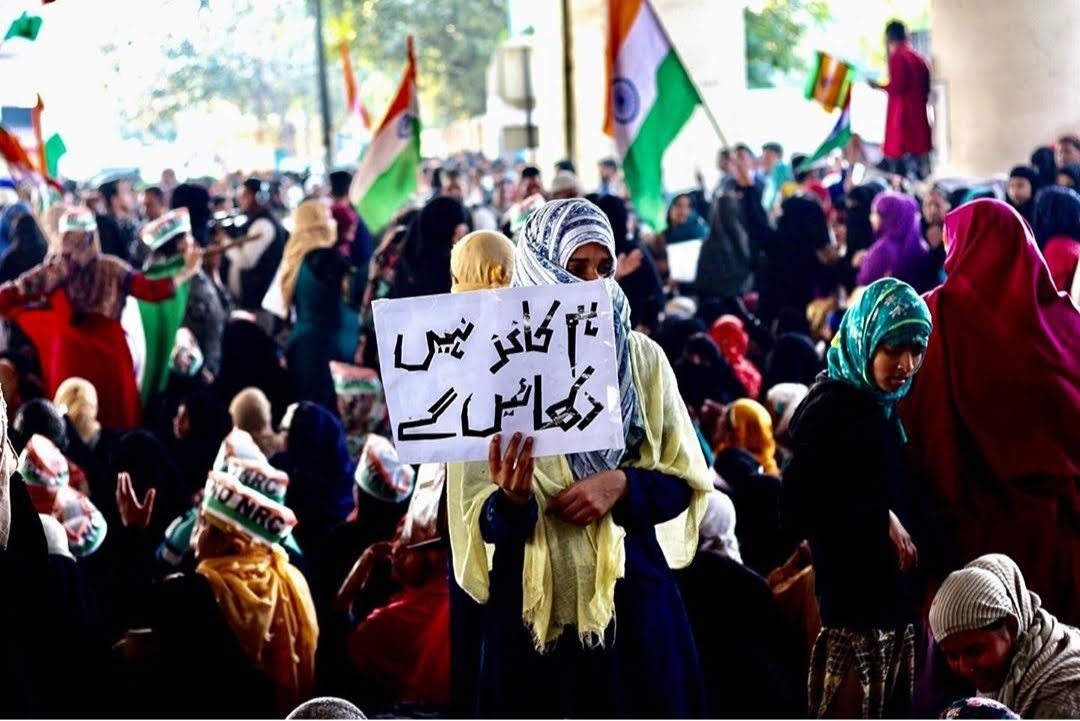
Vikram Raj & Imran Boniyari
Into the crowded streets of Jehanabad in Bihar, people are greeting each other Eid ul Adha- the annual festival marked by Muslims globally in commemoration of the sacrifice of their Prophet Abraham. In a small lane, by the roadside lies the concrete house of the Imams where Muzammil for the second time in a row will not make Kebabs. “My brother liked Kebabs on Eid ul Adha, we will not be making any for the second consecutive Eid ul Adha, my brother spent in jail,” Muzammil says, trying to clear his throat.

His brother, Sharjeel Imam is one of the prominent names in the list of people arrested in the Delhi Pogrom case last year. It has been more than a year and a half since Sharjeel’s arrest.
Hundreds of students and activists were arrested in cases related to the protests. Sharjeel Imam was detained
The Citizenship Amendment Act (CAA) proposed to use religion as an eligibility criterion for citizenship. On the 13th of December 2019, the CAA became a law. This evoked widespread protests. On 15th December, a similar protest that was organized by the students of Jamia Millia Islamia University in Delhi was brutally thwarted by the police, several students were assaulted. The same night, a few women decided to occupy a major road in the vicinity of the university. These sit-in protests became famous as “Shaheen Bagh protests” and become the face of the entire resistance to CAA.

Many Shaheen Bagh-like women-led sit-in protests were organized across India.
The state of Delhi elected its legislative assembly on 8th February which was followed by a highly inflammatory speech by members of BJP, including a call to “shoot traitors”. The anti-CAA protestors were cast as anti-national and therefore traitors. Several incidences of shootings took place.
On 23rd February, sit-in demonstrations were organized against the citizenship law at Jaffrabad and Chand Bagh near Maujpur Chowk. The protesters had occupied roads since Saturday evening, nearly two months after a similar protest began in South Delhi’s Shaheen Bagh.
In this tense atmosphere, BJP politician Kapil Mishra gave a speech calling for “clearing of protesters.” After 70 days of peaceful protests, the seeds of violence were sown.
This was followed by targeted and organized violence in the northeastern part of New Delhi. Around 53 people, mostly Muslims died and more than 200 people were injured. Many mosques were burnt and destroyed, and Muslim houses and shops were looted and burnt.

According to independent fact finding reports, the violence was led by far-right Hindu fundamentalist groups. The Delhi violence was marked by Police complicity, and saw a blockade of medical help to the injured, targeting of journalists, and sexual assaults across the State of Delhi and Uttar Pradesh. In the aftermath of violence, a false narrative of victim-blaming was manufactured and was circulated.
We spoke to Sharjeel’s brother, Muzammil Imam, to know the whole matter in depth.
When the Anti-CAA protests erupted from all across the country, Sharjeel gave speeches at various places including Jamia and Aligarh. Some specified parts of his speech were clipped and they went viral on social media. His speech was termed as “anti-national” by the police and the government. And he was reportedly absconded even though it was well known that he was in Patna.
During the alleged search of Sharjeel, his younger brother Muzammil Imam (who’s also a political activist) and some relatives were taken into custody by the police and subjected to various physical and mental torture.
Muzammil told The Kashmiriyat, “On January 28, 2020, at 4 o’clock in the morning, the police took me into custody, blindfolded me and not only threatened me, but also took me to the police station to remove my clothes, and beat my up.”
“Since early morning till around four in the evening, until Sharjeel surrendered himself, the police made me sit on the ground without clothes,” said Muzammil Imam.
After Sharjeel was arrested on 28 January 2020, he was sent to Guwahati Jail. About a month after his arrest, a communal pogrom took place in North East Delhi in which more than 50 people died and more than 200 were injured.
Later on, Delhi Police also named Sharjeel in the list of persons responsible for the Delhi pogrom. During this whole period, due to global pandemic, a lockdown was imposed across the country and Sharjeel couldn’t even meet his family. In July 2020, he was tested positive for Covid-19. Sharjeel recovered from his illness. Later that year, he was shifted to Tihar Jail in Delhi where some of his friends went to meet him.
Sharjeel’s friends told his family that he told them, he was happier in Guwahati jail because of the intellectual capital he was getting around the prisoners there.
Muzammil said that while in Tihar, Sharjeel used his engineering skill to fix many defects in not only the software of the jail computer but also the telecommunication system that was used by the prisoners to communicate with their family.
On July 15, 2021, a Delhi Court heard Imam’s bail application through his Advocate Tanveer Ahmed Mir, who posed a question, “If somebody is a critic of a constitutional policy, does that enable the State to book him for sedition?”
“Question would be whether criticism of anybody and in this case by Sharjeel enables the State to pick him up, lock him up and through him in the dungeon? A person who goes to Jawaharlal Nehru University will go to Tihar as well. Probably its the route now,” Sharjeel’s advocate submitted.
The case of Khalid Saifi
Meanwhile, family sources of CAA activist and founder of ‘United Against Hate’, Khalid Saifi who was booked by the Delhi police under UAPA charges told The Kashmiriyat that Saifi had been booked under three cases.
“Saifi has three cases registered against him and has got bail in two of them. The first one is FIR 44, which was registered under Jagatpuri police station,” said the source.
They added that the second case was FIR 101, which was being investigated by the Delhi Police crime branch. And while, the third case was FIR 59, where Saifi had been charged under the controversial anti-terror law called Unlawful Activities (Prevention) Act (UAPA).
“He will, therefore, continue to be lodged in Mandoli jail,” said his family.
Athar Khan (25), a BBA student at a private college in Delhi was also detained after violence in Delhi. According to his family, he was booked under the UAPA following which his family denied revealing anything about him.
Athar comes from a family that runs a small-scale spice store. At present, Athar languishes in Tihar jail and it’s been more than a year.
The United Nations (UN) urged India to release activists who have been arrested for protesting against the Citizenship Amendment Act (CAA).
A statement released by the UN experts read, “Authorities should immediately release all human rights defenders who are currently being held in pre-trial detention without sufficient evidence, often simply on the basis of speeches they made criticising the discriminatory nature of the CAA.”
The statement specifically mentions 11 individuals, including Meeran Haider, Gulfisha Fatima, Safoora Zargar, Asif Iqbal Tanha, Devangana Kalita, Natasha Narwal, Khalid Saifi, Shifa Ur Rehman, Dr Kafeel Khan, Sharjeel Imam and Akhil Gogoi.
“Many of the above individual cases include serious allegations of human rights violation, torture and ill-treatment. The experts have also alleged that bail to these protesters was being denied using “counter-terrorism or national security legislation, and using procedural police powers.”
Since the Indian parliament passed the Citizenship Amendment Act, a sense of fear has raged among the Muslim minority population of india which resulted into mass protests and criticism from the like minded people of the world. India faced backlash from some opposition political parties as well as the neighboring countries.
On 11 December 2019, the Shaheen Bagh protest started. It was a sit-in protest in Delhi, India, that began on 15 December 2019 and lasted until 24 March 2020. The protest was led by women who blocked a major road at Shaheen Bagh using non-violent resistance.

Mainly consisting of Muslim women, the protest began in response to the passage of the Citizenship (Amendment) Act (CAA) on 11 December 2019 and the ensuing police intervention against students at Jamia Millia Islamia who were opposing the Amendment.
The protesters agitated against the citizenship issues of the CAA, National Register of Citizens (NRC) and National Population Register (NPR), in addition to police brutality, unemployment, and poverty, and for women’s safety. The Delhi Police barricaded major roads in and around the area, affecting more than 100,000 vehicles a day and adding hours to some journeys.
COVID-19 lockdown was imposed in Delhi and the protesters were forcibly evacuated from the site and some were arrested and sent to jails.
After the end of Anti CAA protests, the investigation agencies and police carried Joint operations in which many prominent activists, student leaders, political activists were detained and sent to unknown jails. The arrested students were mostly from Jamia Millia Islamia and Aligarh Muslim University.
Many families have not returned to their homes and many others have left the area, leading to demographic change. Hundreds of Muslim youth have been incarcerated. Activists, who had participated in earlier on-going protests in Delhi, have now been falsely implicated in the riots and been arrested and held without trial, often charged under draconian laws ostentatiously meant for controlling terrorism.
Journalists who reported on the true nature of the “riots” – in fact a pogrom, are being harassed by the police. In this working report we provide an overview of the relevant media reports on violence and aftermath following the Delhi Riots.




